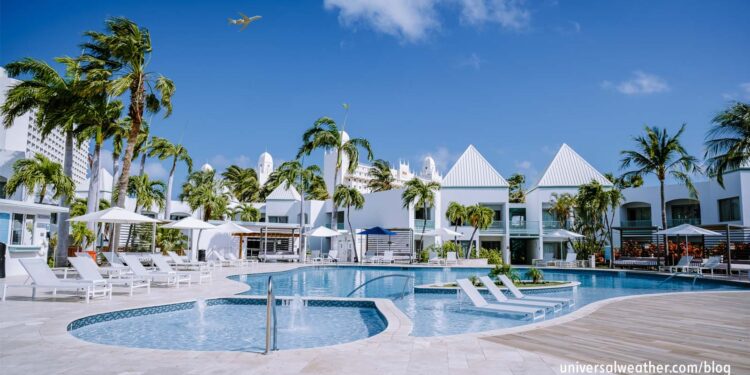Business Aircraft Operations to Aruba: Fuel & Hotels

This is a post by author Johrainne Lacle-Giron. At the time of its writing, Johrainne was based at Universal Aviation Aruba – Oranjestad, which discontinued operation of the GAT in January 2018.
This business aviation blog post is part of a series on operating in Aruba and continues from our last article: “Business Aircraft Operations to Aruba: CIQ Information.”
For business aircraft operations into Aruba, fuel and hotel planning are pretty straightforward. Fuel services at Aruba (TNCA) are generally efficient for both destination and tech stops; however, you may encounter delays during peak hours or with short-notice requests. Aruba is somewhat unique in that you pay your ground handler for fuel, who in turn has credit terms with the fueler and makes the payment for the operator. For hotels, you need make sure you have secured your overnight parking first.
Below is what you need to know:
1. Know the fuel uplift process
Fuel is delivered to the airport storage facilities at TNCA from a refinery in Aruba. There is only one fuel supplier at this location which is the Aruba Airport Authority, and the same fuel trucks service both General Aviation (GA) and commercial airlines. Scheduled commercial operations and terminal are on one side of the field, while GA and the fixed-base operator are on the other. Once a fuel uplift request is received, the ground handler fills out a fuel authorization form and sends it to the fueler to confirm arrangements. Be aware that there may be fueling delays during peak operation hours, which are 1300-1600 local, as commercial flights have priority for fueling. Fuel quality is checked daily by the supplier, and additional checks can be requested prior to fueling.
2. Be aware of documentation procedures
The ground handler will provide the fueler with a fuel authorization form, and this is the only documentation that needs to be given to the fueler. The captain is responsible for overseeing the fuel uplift and will receive a fuel receipt, signed by the fueler, confirming volume and time of uplift. Fuel uplifts are indicated in gallons, and these forms are in English.
3. Posted fuel price varies weekly
Posted fuel prices change weekly. The fuel provider advises the ground handler of new pricing each Monday. All payments for fuel, by contractual arrangement, are made to the ground handler who will make payment to the fueler. Aviation fuel cards are accepted by the ground handler, along with consumer credit cards and cash in the form of US dollars and local currency. The Aruba Airport Authority receives a fee (margin on the price of fuel) per gallon delivered on all fuel uplifts.
4. Fuel delivery takes longer during peak periods
Average fueling time at TNCA depends on volume requested, but uplifts take longer during periods of busy commercial activity. For this reason it’s best to request and confirm fuel uplifts in advance and to specify desired fuel volume. It’s recommended to fuel during the day, as fuel trucks are often busy with commercial carriers 1300-1600 local. Also, if you have an early morning flight, it’s recommended to fuel the night before.
5. Fuel uplifts cost more at night
A late-night fuel uplift charge applies after 2300 local, and in most cases, fuel is only provided to air ambulance flights after midnight.
6. Notify fuel requirements as early as possible
Advance notification is always a plus when arranging TNCA fuel uplifts. If you’ve not confirmed fuel delivery in advance, it’s best to call inbound while on descent on frequency 131.45. Your ground handler will try to ensure that a fuel truck is ready on arrival. For tech stops it’s important to make fuel uplift requests as early as possible and to avoid weekends – around noon – as commercial traffic flows are typically heavy at that time.
7. And now on to hotels … Good news! Many options are available.
Most of the hotels on the island are located on the beach about 20-25 minutes from the airport depending on traffic. Hotel options are also available in the city – a drive of about 10-15 minutes from the airport depending on traffic. You’ll find a wide selection of 4- and 5-star hotels in Aruba, including many popular international chains. Depending on the season, crew rooms at 4- and 5-star properties can range from $200-$400 USD for standard rooms. Your ground handler may have contractual arrangements with certain hotels and in some cases better prices, as well as additional included services. Be aware that, for short-notice requests during high season, you may not get your preferred hotels in Aruba.
8. Hotels are more expensive during high season
During high season preferred hotel accommodations in Aruba are more difficult to obtain, prices will be higher, and there may be cancellation fees. This becomes an important consideration if you’re not able to obtain overnight parking at TNCA and are faced with a drop and go and a subsequent hotel night cancellation. For this reason it’s important to confirm aircraft parking with your ground handler in advance to avoid no-show charges from pre-confirmed hotels. Note that TNCA has 15 GA parking spots depending on size of aircraft.
9. Additional reading: Business Aircraft Ops to Aruba – Series Index
Note: Links will be updated as articles are published.
- Part 1 – Airport operations
- Part 2 – Ground handling and security
- Part 3 – Catering, Cars, Pets & Guns
- Part 4 – Permits, PPRs, flight planning and weather
- Part 5 – CIQ information
- Part 6 – Fuel and hotels
Conclusion
When you travel to TNCA during high season, it’s important to confirm aircraft parking, fuel, and hotel accommodations in advance. If overnight parking is denied on landing – due to a full ramp – you may find that your confirmed hotel arrangements are non-refundable.
Questions?
If you have any questions about this article or would like assistance planning your next trip to Aruba, contact us at operationalinsight@univ-wea.com.




